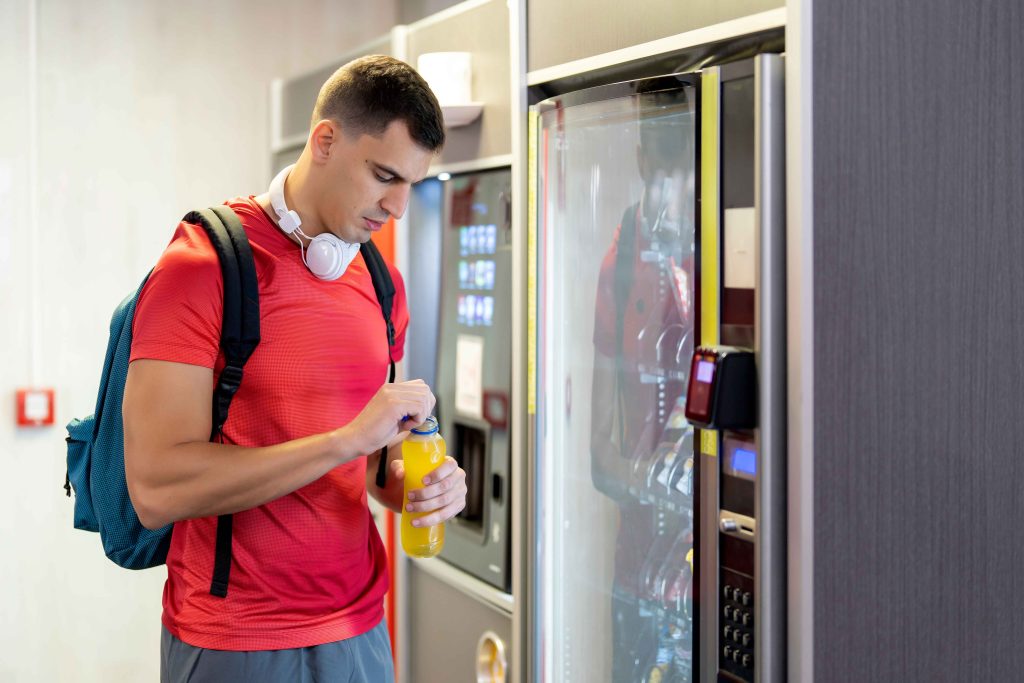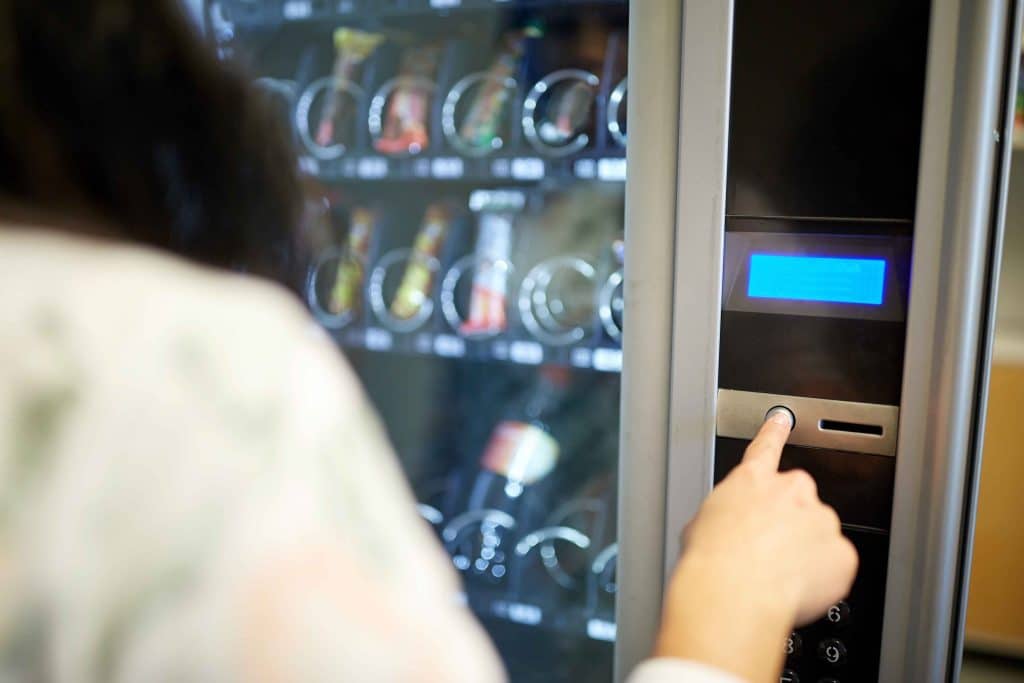Isn’t it time we reconsidered the way we consume on-the-go meals? With the rise of zero waste smart vending, we’re seeing a shift towards sustainable, convenient, and efficient consumption. These machines, designed to eliminate waste, offer reusable packaging and locally sourced foods, supporting both the environment and community.
But, the question remains: how will these innovations shape the future of on-the-go eating? We’re about to embark on a journey of discovery, delving into this intriguing topic. Will you join us as we explore the potential of this budding technology?
Get Free Consultation
Key Takeaways
- Zero waste vending incorporates eco-friendly materials, sustainable sourcing, and waste reduction strategies, revolutionizing on-the-go eating.
- Innovative technologies like biodegradable packaging and refill stations make zero waste smart vending practical and consumer-friendly.
- Companies adopting zero waste smart vending benefit from enhanced brand reputation, cost savings, and access to eco-conscious consumers.
- The future of sustainable vending lies in technological innovations such as smart vending machines and renewable energy sources integration.
Read more about our Smart Vending Solutions!
Understanding Zero Waste Smart Vending
Let’s get to grips with the concept of zero waste smart vending. We need to understand its principles, the urgent need for sustainability in vending, and the current situation regarding waste in the smart vending industry. This understanding is paramount as we move towards more sustainable eating habits on-the-go.
Principles of Zero Waste
How does zero waste vending work and what principles guide its operation, you might ask? It’s a process grounded in a few key principles:
- Waste Audit: We start by analyzing the waste produced, identifying what can be reduced, reused, or recycled.
- Recycling Systems: We implement systems for proper segregation and recycling of waste.
- Composting Options: Organic waste is composted, reducing landfill contributions.
- Green Certifications: We prioritize products with eco-friendly certifications, ensuring sustainability.
- Eco-friendly Materials: We use materials that are biodegradable or recyclable, lessening our carbon footprint.
These principles ensure sustainable manufacturing and a circular economy, emphasizing waste reduction strategies and upcycling initiatives. They are the foundation of zero waste smart vending. It’s not just about being green, it’s about doing the right thing.
The Need for Sustainability in Smart Vending
As we delve into the concept of zero waste smart vending, it’s clear that sustainability is no longer optional in the vending industry; it’s a necessity. Sustainable sourcing and green investments are vital in reducing waste management costs and carbon footprint.
We must prioritize localized production to minimize transportation emissions, enhance energy efficiency, and utilize compostable materials in packaging. This shift also necessitates the establishment of sustainable supply chains, ensuring eco-friendly operations from start to finish.
Lastly, the inclusion of recyclable components in vending machines themselves is crucial. By adopting these practices, we not only contribute to the environment but also create a viable and profitable business model that aligns with the global push towards sustainability.

Current State of Smart Vending Waste
In the world of vending, we’re currently grappling with a significant waste problem that jeopardizes our environment and contradicts our sustainability goals. Traditional vending machines, with their operational costs and waste generation, are not compatible with our eco-friendly vision.
To understand the gravity of the situation, consider these points:
- Inefficient vending operations lead to significant waste, requiring effective waste management.
- Disposal methods for vending waste often have detrimental local impacts.
- The consumption patterns of on-the-go eaters amplify the waste issue.
- Redesigning vending machines for efficiency and eco-friendly materials is a pressing need.
- Measuring and reducing waste is a complex but necessary task.
We must rethink our approach to vending, striving for zero waste and improved efficiency.
Innovative Zero Waste Smart Vending Technologies
Let’s shift our focus to the innovative technologies taking the zero waste smart vending industry by storm. These include biodegradable packaging solutions, bulk dispensing innovations, and reusable container systems. Each of these plays a significant role in reducing waste and contributing to a more sustainable future.
Biodegradable Packaging Solutions
Countless biodegradable packaging solutions are transforming the landscape of zero waste smart vending technologies. We’re seeing an influx of innovative materials replacing traditional plastic containers, and it’s making on-the-go eating more sustainable than ever.
- Compostable cutlery is now a staple in our vending machines, made from cornstarch and bamboo.
- Edible packaging made from seaweed provides a tasty, zero waste alternative.
- Mushroom-based materials and algae containers are revolutionizing how we think about food storage.
- Bamboo boxes, peanut shell plates, and rice husk cups are offering sturdy, eco-friendly options.
- Bagasse bowls and cornstarch straws are proving that convenience doesn’t have to come at the cost of the environment.
These biodegradable solutions are leading the charge towards a zero waste smart vending future.
Bulk Dispensing Innovations
Shifting our focus to bulk dispensing, we’re witnessing groundbreaking innovations that are redefining zero waste vending technologies. Material sourcing is now centered on eco-friendly options, guided by thorough cost analysis. This, coupled with market penetration of these technologies, is transforming the vending landscape.
Consumer education plays a vital role in this shift. Through collaborative efforts, we’re raising awareness about waste management and green initiatives. Technological advancements are not only improving vending aesthetics but also enhancing the user experience. They’re making bulk dispensing more appealing to the masses.
A profitability study shows that these changes are beneficial, not just environmentally, but financially. The future of on-the-go eating is here, and it’s sustainable, efficient, and promising.
Reusable Container Systems
Moving on from bulk dispensing, another innovative approach gaining traction in zero waste smart vending technologies is the use of reusable container systems. These systems incorporate elements like green materials and sustainable manufacturing in container design, offering a practical solution to single-use waste.
To pique your interest, we’ve highlighted five key components:
- Refill stations: Convenient locations for customers to refill their containers.
- Reuse incentives: Rewards or discounts offered to encourage container reuse.
- Cleaning protocols: Ensuring containers comply with hygiene standards.
- Container tracking: Using technology to track and manage container circulation.
- Customer education and reusable container marketing: Strategies to promote adoption and correct usage.
Benefits of Adopting Zero Waste Smart Vending Machines
Let’s now look at the advantages of adopting zero waste smart vending machines. First, we’ll discuss how these machines can help reduce environmental impact. Then we’ll explore how they can positively influence consumer perception and brand image, and finally, we’ll touch on the benefits of regulatory compliance and incentives.

Environmental Impact Reduction
How can we overlook the significant environmental benefits of adopting zero waste smart vending machines? These machines champion several environmental initiatives, all designed to reduce the carbon footprint and promote energy efficiency.
- Recycling Initiatives: These machines encourage users to recycle, playing a big role in waste analysis and management.
- Composting Options: They provide options for composting organic materials, promoting a circle of sustainability.
- Sustainable Production: Zero waste vending machines are made through green manufacturing processes, using eco-friendly design principles.
- Environmental Education: Using these machines can be an educative experience, teaching users about sustainable practices.
- Energy Efficiency: Our machines are designed for maximum energy efficiency, further reducing their environmental impact.
We’re not just selling products—we’re selling a greener future.
Consumer Perception and Brand Image
Beyond the environmental benefits, adopting zero waste smart vending machines also positively influences consumer perception and enhances brand image. In an era where green marketing is on the rise, such an initiative can lead to a significant perception shift. The public’s growing eco-consciousness means that brands embracing social responsibility and sustainability messaging stand to reap the rewards.
The benefits aren’t merely theoretical. We’ve seen how consumer attitudes towards waste can generate a waste-related stigma, damaging brand perception. By contrast, zero waste smart vending machines provide a tangible demonstration of a brand’s commitment to sustainability. This isn’t just about image enhancement; it’s a form of brand differentiation. In a crowded market, eco-conscious branding could be the deciding factor for many consumers.
Regulatory Compliance and Incentives
In addition to enhancing brand image, adopting zero waste smart vending machines also helps businesses comply with environmental regulations and potentially benefit from eco-friendly incentives. It’s a way to navigate regulation loopholes and reduce compliance costs. Regulatory bodies are increasingly recognizing the importance of these initiatives, making it an evolving space to watch.
- Incentive structures that reward green initiatives
- Compliance enforcement’s role in pushing eco-friendly practices
- The effectiveness of incentives in driving change
- Policy impacts on compliance challenges
- Criticisms of current incentive strategies
The evolution of regulations continues to shape the landscape, influencing the effectiveness of incentive strategies. While there are challenges, the future of on-the-go eating could be shaped significantly by the adoption of zero waste vending machines.
Case Studies: Success Stories in Zero Waste Smart Vending
Let’s shift our focus to some inspiring success stories in the realm of zero waste vending. From corporate implementations to innovations in the educational sector, there’s a lot to learn from those leading the charge. We’ll also look at how the public sector is contributing to this eco-friendly evolution.
Corporate Implementations
Several companies have successfully integrated zero waste vending into their operations, setting impressive examples for the industry. These corporate green initiatives have transformed eco-conscious workplaces into sustainable franchising models.
- Greening franchises like Starbucks have implemented waste management strategies that include waste less restaurants and eco-friendly cafeterias.
- Carbon neutral vending has been adopted by firms such as Unilever, reducing their carbon footprint significantly.
- Green corporate canteens are rising in popularity, with companies like Google leading the way.
- The concept of sustainable snack bars is being embraced by innovative companies like Pret A Manger.
- Companies like IKEA are redefining their waste strategies to incorporate zero waste vending.
Through such practices, we’re seeing the dawn of a new era in sustainable on-the-go eating.
Educational Sector Innovations
Moving beyond corporate implementations, we’re seeing educational institutions also stepping up to embrace zero waste vending, showcasing some truly successful stories. These school initiatives include everything from eco-friendly cafeterias serving waste-free lunchboxes to green fundraisers.
We’re noticing an increased student involvement in recycling programs and composting lessons, all part of a broader green curriculum. This sustainability education extends beyond the classrooms, with eco clubs promoting practical experiences. For example, students are taught to sort their waste, reduce their consumption, and understand the impact of their choices.
It’s inspiring to see the next generation not only learning about the importance of sustainability but actively engaging in it. These educational sector innovations are setting a new standard in greening our future.
Public Sector Contributions
In the realm of public sector contributions, there’s a growing trend towards zero waste vending, with several success stories highlighting the positive impact of this initiative. These stories showcase the significant role of governmental policies, funding strategies, and legislation changes in promoting zero waste.
- Governmental policies are steering towards green procurement and policy enforcement.
- Funding strategies have been implemented to support infrastructure planning and waste management.
- Public awareness campaigns have been launched to encourage community involvement.
- Legislation changes have been introduced to facilitate municipal partnerships.
- Community involvement has proven key in the success of these initiatives, demonstrating the immense potential of a collaborative approach.
These cases prove that with the right strategies, it’s possible to achieve a zero waste vending future.
The Future of Sustainable Smart Vending
Let’s now turn our attention to the future of sustainable vending. We’ll explore emerging trends in zero waste technology and examine the challenges to widespread adoption. It’s an exciting, yet complex, landscape that’s shaping our way of on-the-go eating.

Emerging Trends in Zero Waste Smart Vending Technology
We’re seeing a seismic shift in the vending industry as zero waste technology becomes increasingly prevalent. This movement is propelled by several emerging trends:
- Wasteless snacks: The rise of sustainable snacks in environmentally friendly packaging.
- Green vendors: Vendors are adopting waste reduction strategies and implementing sustainability policies.
- Eco-friendly machines: Technological advancements are enabling the production of machines that are more energy-efficient.
- Consumer awareness: There’s a growing awareness among consumers about the importance of sustainability, driving the demand for green products.
- Green marketing: Companies are leveraging this consumer awareness, using green marketing to promote their eco-friendly machines and wasteless snacks.
These trends are reshaping the vending industry, making it more sustainable and environmentally friendly.
Challenges to Widespread Adoption
Despite the promising advancements in zero waste vending, there are still considerable hurdles to overcome for widespread adoption. Adoption barriers, such as infrastructure upgrades and cost implications, can deter businesses from embracing this eco-friendly initiative.
Effective waste management is another challenge, particularly in regions lacking the necessary facilities. Cultural shifts, often requiring extensive consumer education, are key to modifying public consumption habits. Technological advancements, while exciting, pose their own difficulties, particularly in terms of supply chain challenges and the need for operational efficiency.
Furthermore, vending design modifications may be necessary to accommodate new methods. We must tackle these issues head-on if we’re to truly revolutionize on-the-go eating for a sustainable future.
Protect your vending technology from cyber threats. Read more!
Challenges to Widespread Adoption
While the potential for sustainable vending machines is enormous, we’ve got a long road ahead to overcome the formidable challenges that stand in the way of their widespread adoption. The roadblocks are various and complex, and they include:
- Waste statistic analysis: How to measure the real impact of this new sustainable design?
- Financial viability: Is it profitable to operate these zero waste vending machines considering the high maintenance cost and energy efficiency?
- Cultural adaptation: Will consumers adapt to this new way of on-the-go eating?
- Distribution challenges: How to ensure quality control across various locations?
- Consumer education: How to inform and convince users about the benefits of sustainable vending?
Each challenge offers an exciting opportunity to pioneer a new era in sustainable on-the-go eating.
Conclusion
Winding our way towards a waste-free world, zero waste vending is visibly vital. With innovative ingenuities igniting interest, the benefits are boundless. Celebrating success stories strengthens our stance, signaling sustainability’s surge in the sector. This transformative trend is truly taking off, tailoring the trajectory for the future of food. So, let’s latch onto this lifeline for our planet, lovingly leading us towards lesser litter and more mindful munching.
Vending Solutions
With our smart vending solutions, grab-and-go shopping gets simpler, faster, and more personalized.
Frequently Asked Questions
How Can Consumers Effectively Clean Reusable Containers for Zero Waste Vending Machines?
We’d recommend using eco-friendly detergents and natural cleansers for container sanitization. This upholds hygiene standards while promoting a sustainable lifestyle. It’s an effective cleaning technique and a green solution for waste management in household practices.
What Are the Potential Setbacks or Challenges for Businesses to Adopt Zero Waste Vending?
We’re facing hurdles like high initial investment, sustainability challenges, and public acceptance. Also, implementing cost for technological upgrades, staff training, market analysis, supply chain adaptation, and packaging innovation can be daunting. But we’ll conquer these!
Are There Any Health and Safety Concerns With Using Zero Waste Vending Machines?
We’re concerned about sanitation standards, waste management, and contamination risks. Hygiene practices, machine maintenance, user training, bacterial growth, regular inspections, quality control, and sustainable design all play a role in health and safety with these machines.
How Might Zero Waste Vending Machines Impact the Job Market?
Could zero waste vending machines revolutionize the job market? We believe they’ll stimulate job creation in green jobs, vending innovation, and maintenance careers. Yet, they could also cause job displacement due to automation concerns.
Are There Any Specific Policies or Regulations in Place to Support Zero Waste Vending?
We’re unsure of specific policies supporting zero waste vending. However, regulatory incentives, government support, and eco-friendly legislation could potentially promote it. We’ll need to research policy effectiveness, enforcement, and international regulations further.

